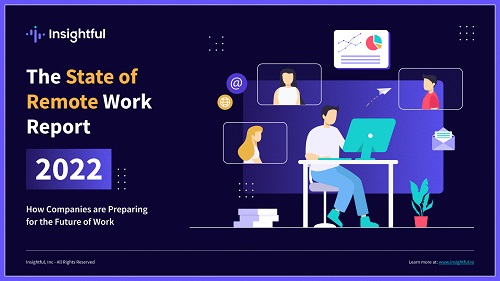Insightful, a workforce analytics and productivity software, released its “The State of Remote Work Report 2022: How Companies are Preparing for the Future of Work,” which finds nearly 64 percent of company leaders believe they don’t have the right tools to ensure productivity. The report is available for free download via the Insightful website.
Key Report Findings:
- 91 percent of company leaders believe they don’t have the right tools to manage remote employee productivity.
- 45 percent of company leaders will allow remote work at least some of the time.
- 68 percent of company leaders permanently will allow their employees to work remotely or hybrid.
- 38 percent of company leaders reported collaboration and communication are the biggest challenges when working remotely.
- 06 percent of company leaders believe employees are less productive in a remote or hybrid environment.
- A 383 percent increase in the adoption of remote and hybrid work was seen among enterprise companies.
The report revealed an increased acceptance and adoption of remote work. However, it also uncovered that many leaders still don’t feel fully equipped to operate optimally in this environment. Among a wide-ranging series of findings, almost two-thirds of respondents stated they don’t have the tools they need to manage their team’s productivity effectively when they are working remotely.
In a further indication that monitoring remote employees’ workloads continues to present challenges, 38.06 percent of company leaders said they believe employees are less productive when working remotely. And 21.38 percent of respondents cited communication and collaboration as the biggest challenges in a distributed work environment.
Despite the challenges expressed, the report revealed that a resounding 71.45 percent of company leaders said they will offer remote work to employees in the future at least some of the time. Further reinforcing that workplaces of the future will be distributed, the report also found that 64.68 percent of company leaders stated that remote and hybrid work will become a permanent fixture in their organization.









